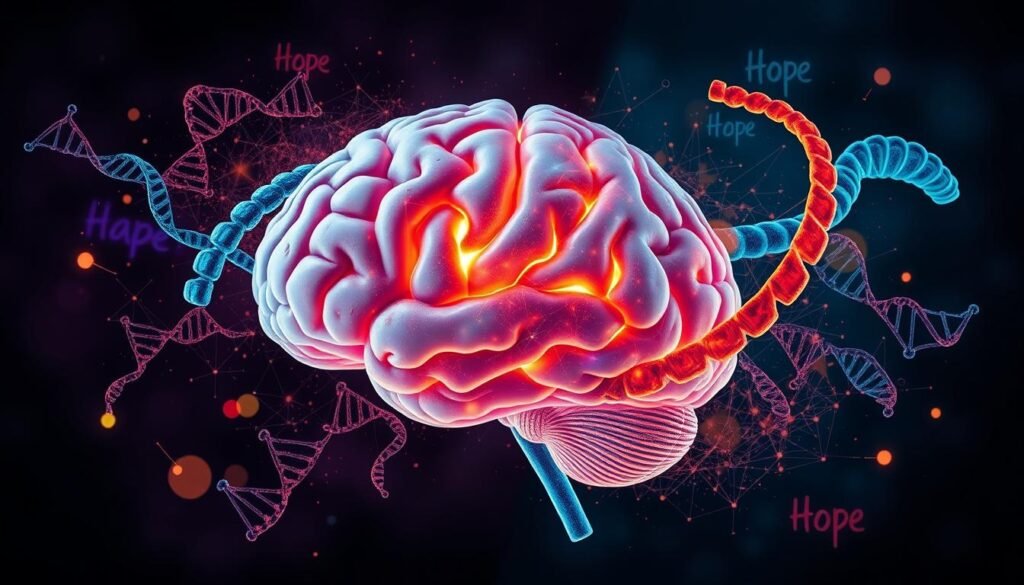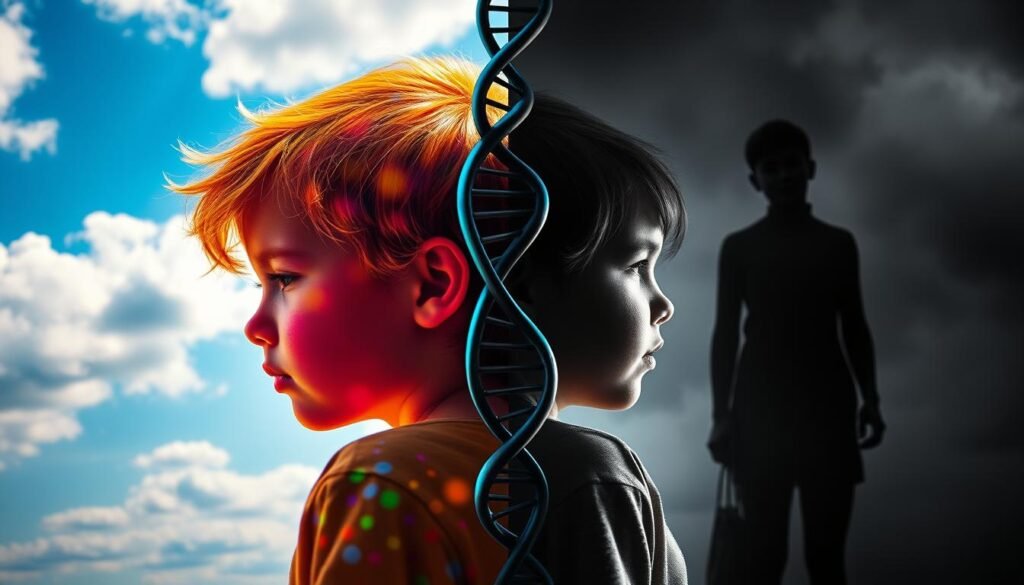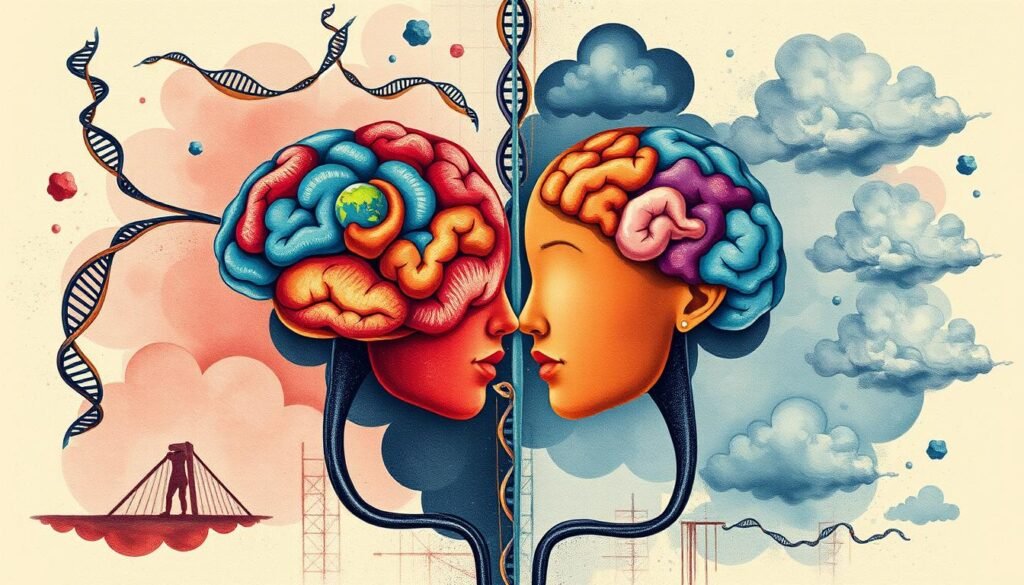Did you know that at least 10% of people in the U.S. will face major depressive disorder sometime in their lives? This fact highlights the need to understand depression’s genetics. Through twin studies, researchers have found that 40-50% of depression cases are due to genetics.
Twin studies shed light on how the risk of depression might be inherited. If you have a parent or sibling with major depression, your risk increases 2-3 times. For those with siblings who developed depression early, the risk can jump 4-5 times. These discoveries help us dive deeper into the genes linked to depression.
In this article, we’ll see why twin studies are key to grasping depression’s genetic roots. We’ll discuss important findings about heritability and sex differences in genetic risk. Plus, we’ll look at how genes and environment together might influence depression. This opens doors to new treatments.
Key Takeaways
- Twin studies reveal that 40-50% of major depression cases stem from genetic factors.
- Major depressive disorder affects at least 10% of individuals in the U.S.
- Risk is significantly higher for those with a familial history of depression.
- Women are twice as likely to experience major depression compared to men.
- Understanding genetics may unlock better treatments for depression.
Introduction to Twin Studies and Depression
Twin studies give us key insights into depression’s genetic roots. When we look at identical twins, they have all the same genes. Fraternal twins, on the other hand, only share half. This comparison helps researchers understand how much genes play a role in depression.
About 10% of people in the U.S. are affected by major depressive disorder. It’s more common in women. The study of Depression and Heritability is vital because it shows how genetics and environment come together to cause depression. We learn a lot about the different factors that lead to this condition.
Many things impact mental health. These include genes, where we grow up, and the experiences we have. By comparing identical and fraternal twins, scientists can see how much genes contribute. This is true even when twins grow up in the same or different places.
Studying twins teaches us a lot about mental health. Especially, it shows us the big role genetics play in conditions like depression. For more on how genetics impact depression, check out this guide.
Understanding the Role of Genetics in Depression
Studying Genetic Factors in Depression is complex but essential. Research shows a big genetic role in major depressive disorder (MDD). In fact, 40% to 50% of the risk comes from genetics.
Genome-wide association studies (GWAS) play a big part in this research. They’ve found 178 genetic risk spots and over 200 possible genes related to MDD. For instance, a study with 1.2 million people in 2021 showed key genetic parts. It found a clear link between genetics and depression rates.

Genes also affect how we handle mood-related chemicals like serotonin. These chemicals are crucial for feeling stable. Moreover, when genes mix with tough life events, depression risks go up.
Stressful events can change our genes in ways that affect us and our kids, possibly making depression more likely. Understanding genetics can lead to treatments that match a person’s genetic makeup.
As we learn more about genetics in MDD, we can better prevent it. This means looking at both genes and environment in treatment. For those digging deeper, the National Institutes of Health have detailed studies. They offer insights into depression’s genetic roots, including twin studies and GWAS.
Twin Studies and Depression: What Do They Tell Us About Genetics?
Twin studies are key to learning how genes influence depression. By studying identical and fraternal twins, scientists gain insight. Identical twins share all their genes, while fraternal twins share only half. This makes twin studies extremely valuable.
Research shows that if one identical twin has depression, it affects the other about 76% of the time. But for fraternal twins, it’s only 19%. This proves genetics play a big role in depression.
Even when identical twins grow up apart, they still show a 67% chance of both having depression. This shows genetics are more influential than environment. Depression is also 1.5 to 3 times more common among close biological relatives.
If a parent or sibling has depression, your risk almost triples. Dysthymic Disorder is another type of depression that is more common in families. When there’s alcohol abuse in the family, the risk increases.
Brain scans help us understand the genetic links to depression. They show changes in the brains of those with depression. These include a smaller ventromedial cortex and different activity in parts of the brain. This research helps us better understand depression.
To conclude, twin studies offer critical insights into the genetic basis of depression. This research is paving the way for identifying the genes linked to depressive disorders.
Heritability of Depression: Key Findings from Twin Studies
The study of depression’s heritability is key in Twin Studies in Psychology. These studies show how genes play a role in depression. They find that about 37% of depression’s risk comes from genetics. This proves family ties play a big part in the disorder.
The Concept of Heritability in Major Depression
Heritability helps us get why depression happens. Studies show that if your family has depression history, you’re more likely to get it too. Especially, kids and teens with depressed parents are at double the risk. This shows how crucial genes are in understanding depression’s roots.
Meta-Analysis Results on Twin Studies
Meta-analysis of Twin Studies reveals a strong genetic link to depression. These studies tell us genes mainly cause depression, but environment also matters. The role of shared environments is small, making genes the main factor. This calls for more research into depression’s genetic side.
| Study Type | Heritability Estimate | Key Findings |
|---|---|---|
| Twin Studies | 37% | Significant familial component; increased risk in relatives. |
| Family Studies | 2x Risk | Children/adolescents with MDD show twofold risk to relatives. |
| Genome-Wide Studies | 178 Risk Loci Identified | Over 200 candidate genes linked to major depressive disorder. |

The Impact of Sex Differences on Depression Genetics
Studies on the impact of sex differences in mental health show how gender and genetics link to depression. Women are more likely to face major depression than men, with the rates being more than 1.7 times higher. By the age of 18, this gap slightly lessens but still stays significant.
This difference starts in the teen years and can last into later life. However, the gap does get a bit smaller as people grow older.
Even though women are more prone to depression, both genders face it in somewhat similar ways. The main differences are in the symptoms. Women might eat more, sleep a lot, and have more physical pains. They also often deal with other tough conditions like anxiety and PTSD alongside depression.
Research with twins shows that depression is more heritable for young girls than boys. This tells us that genetics, along with the environment, affects how depression develops. It shows that both boys and girls get their depression traits in different ways.
The role of gender in mental health genetics is complex. It ties deeply with both our social world and our surroundings. Knowing these sex differences in mental health could change how we treat and prevent depression. It leads towards care that’s more customized for each person.

Notable Twin Studies Research and Their Contributions
Twin Studies have been key in understanding how genes affect depression. Through these studies, scientists have learned about the role of genetics in mental health. They have shown us how complex the link between our DNA and mental health is.
These major studies have given us deep insights. They have revealed a lot about depression and anxiety disorders. This understanding helps us approach mental health in new ways.
A Look at Major Twin Studies Conducted
Looking back, we see how important twin studies have been. In 1875, Sir Francis Galton began to explore how genetics and environment play roles in our lives. This work set the stage for all future studies.
The Swedish Twin Registry is an amazing resource. It has data on 194,000 twins. Researchers use it to study many health conditions, like heart disease and depression.
The Minnesota Study of Twins Reared Apart started in 1979. It found amazing personality similarities in 137 pairs of twins. This study really supports the idea that genetics shape us.
Summary of Findings and Their Implications
Findings from twin studies show us how genetics impact depression. Studies prove identical twins are more similar than fraternal twins. This backs up the idea that genes play a big role in mental health issues.
Twin studies have also shed light on other conditions. Using advanced scans, researchers can now identify genetic markers linked to depression. This understanding helps in creating more effective treatments.
For more info, check out this complete guide. It covers the progress and hurdles in Twin Studies Research.
Genetic Factors in Depression: What Do We Know?
Looking into genetics gives us clues about depression. Genetic Analysis of Depression shows some genes might make people more prone to it. However, it’s not about one gene, but a mix of many. Identical twins studies reveal they have a 70% chance of both having depression if one does. This shows how strong genetics can be.
Identifying Risk Variants through Genetic Analysis
Researchers are digging into our DNA to find Risk Variants for Depression. Using studies from across the globe, they found depression’s heritability is about 37%. Also, if a parent has depression, their kids are much more likely to have it too. These discoveries are crucial but understanding depression fully is still a big challenge.
How Genetics Interacts with Environmental Factors
What happens to us in life matters just as much as our genes. Bad experiences and lack of support can bring out depression. Studies with twins show how life events and genetics mix differently over time. To really get depression, we have to look at both genes and life. For more on how genes affect depression, read this study.
Familial Patterns: Depression and Family History
Family history is key when looking at depression risk. People with a first-degree relative who has major depression are two to three times more likely to get it too. Understanding family patterns is crucial because genetics play a big part in mental health.
The Impact of Family History on Depression Risk
Family history is indeed significant in gauging depression risk. Families with depression often see it recur, with risks higher than in those without such history. Genetics are a big factor, which underlines the need for early help for those at risk.
Adoption Studies vs. Twin Studies: A Comparison
Adoption and twin studies offer clues on genetics versus environmental factors. While twin studies focus on genetics, adoption studies spotlight the role of upbringing. Together, they provide a clearer picture of depression’s causes, blending genetics with environment impacts.
Knowing your family history is vital for mental health. It helps in finding the best ways to manage and prevent depression. Understanding what triggers depression is also crucial. It leads to better ways to tackle mental health challenges.
Conclusion
Twin studies shed light on how our genes play a part in depression. They show that 40% of depression risk comes from genetics. This suggests that genes matter a lot in understanding depression.
Also, these studies reveal that men and women are affected differently. This means we need different ways to treat and prevent depression for them. Knowing about genetic patterns helps in treating depression better, especially when family history plays a part.
Future genetic research is very important. Depression might lead in causing health problems by 2030. By understanding its genetic aspects, we can create better treatments. This could help reduce depression’s toll on people and society.